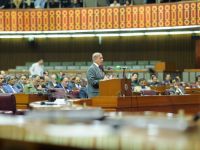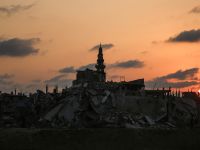By Justin Keay
LONDON (WNL) -- International anxiety about Kosovo's recent municipal elections had been running high. As the Organization for Security and Cooperation in Europe (OSCE) marshaled thousands of officials to run and monitor the polling stations, peacekeepers stepped up their military presence. Many had argued that the decision of UN Special Administrator Bernard Kouchner to hold elections was misguided and premature: Fresh from the horrors of war, Kosovars were in no fit state to respond to the subtleties of the ballot box, which anyhow further disenfranchised remaining Serbs in the territory. Widespread violence was anticipated at many polling stations, especially in rural areas where peacekeeping troops are scarce.
In the event, the pessimists were wrong. From the point of view of just about everybody except Serbia, which called the elections "unacceptable because they are single-ethnic and contrary to the proclaimed goals and responsibilities of the international community," Kosovo's municipal elections have been a resounding success.
Some 80 percent of those eligible to vote did -- a turnout Gore and Bush could only dream of -- while polling stations across the country stayed open for up to eight hours longer than initially scheduled. The results also confirmed that the territory now has a defined party system, with three parties clearly emerging from the vote.
"Whichever way you look at it, these elections were a massive step forward for Kosovo," says James Pettifer of the Institute of Balkan Studies in Salonika, Greece, who was an advisor to the OSCE in Kosovo during the vote. He points out that irregularities were few, and there were few incidents of violence.
He is not the only person to congratulate the Kosovars. The OSCE, in its immediate post election report, said voting was free and fair whilst the United Nations, the U.S. and other western nations have all congratulated the Kosovars for their orderly conduct in the run-up to the elections and on the day itself. As Pettifer puts it: "It was gratifying to see people who only two years ago were being terrorized and on the run standing in an orderly line to cast their vote."
Equally surprising, for many, was the outcome of the ballot. According to unofficial and preliminary results, Dr. Ibrahim Rugova's moderate Democratic League of Kosova (LDK) won 58.13 percent of the vote, taking over 20 of the 30 municipalities, including that of the capital, Pristina. The two parties set up by former guerrilla leaders of the UCK, Hashim Thaci and Ramush Haradinaj, who led the drive for independence that precipitated NATO's intervention, polled less well than expected: Thaci's Democratic Party of Kosova got 27 percent and Haradinaj's Alliance for the Future of Kosova about 8 percent. Clearly disappointed, Thaci -- a popular figure particularly amongst young Kosovars -- conceded defeat but said, "Objectively, I expected a different result." Thaci's apparent acceptance of the outcome has relieved international officials who were concerned some of his supporters might take to the streets to express their disappointment.
For many observers, Rugova's victory seems surprising. Although clearly still respected as the long-time ruler-in-waiting of Kosovo, Rugova appeared to be an almost marginalized figure over the past few years, his message of non-violence paling against the ruthlessness and excesses of the Yugoslav National Army against the people of Kosovo. His controversial appearance in Belgrade alongside Milosevic, at the height of the Serbs' ethnic cleansing of the province did little to boost his image, although many Kosovars accepted he was acting under severe pressure.
However it is clear that in the vote, Rugova was helped by war-weariness. Older Kosovars in particular see him as a sort of Nehru figure: A wise, moderate and educated man, and as such able to translate Kosovo's current uncertain status into de jure independence, with the full blessing of the international community. It seems that other factors were also working in his favor: One is that Kosovo is a deeply conservative society, with a tradition of deferring to seniority; another is that many young, dispossessed Kosovars who would have voted for Thaci's party were not registered.
Another reason for Thaci's surprisingly poor performance was the fact that either he or his party did not know how to "sell him" to voters. Throughout the campaign, 32-year-old Thaci kept a low profile; many of his party's election posters reportedly did not use his image while encouraging Kosovars to vote "for the man who bought independence to Kosovo."
"In essence, the party did not know whether to present him as a brilliant history student from Zurich University or as a fearsome warrior, Kalashnikov in hand," says Pettifer.
The big question is what comes next for Kosovo. The presence of Rugova's LDK at municipalities across the territory should, in theory at least, hold for improved relations between Albanians and Serbs; it also confirms that a majority of people do not want further reprisals against the embattled Serb minority. The LDK has indicated its desire to accommodate "all" those living in the territory, while the fact its representatives do not generally have the freedom-fighter background that characterized
representatives of Thaci's party should make them easier negotiators for the Serbs. However, the big concern for Serbs remaining in Kosovo -- now estimated at around 75,000, compared to 400,000 three years ago -- is that Rugova, once content to accept autonomy for Kosovo within a federal Yugoslavia, is now, in no uncertain terms, calling for the territory's independence.
According to a Radio Free Europe report from late October, Rugova called on "Paris, London, Berlin, and Washington to recognize the independence of Kosovo. The people here have demonstrated that they are for democracy and peace and that they know how to lead Kosovo."
On other occasions Rugova has argued that there is no real alternative to independence for Kosovo. This despite the uncertainty of the international community and the text of UN Resolution 1244 which promises only "substantial autonomy and self-government" under continuing Yugoslav sovereignty.
The situation on the ground makes the international community's equivocations about Kosovo's future even harder to sustain. After the events of the past few years it is grossly unrealistic to expect Kosovo Albanians to accept Serb governance again within the Yugoslav federation; even with Milosevic out of the way, far too much blood has been spilt for this to be a reasonable option.
On Oct. 31, two days after the vote, Yugoslav President Vojislav Kostunica said he was willing to meet with elected Kosovo leaders, including Rugova, to discuss the territory's future. However he ruled out independence warning, "it would be very dangerous for stability in the region" and implying that neighboring Macedonia's future would also be imperiled.
Albanian Kosovars are concerned that with a new man in power in Belgrade and the western community inclining to give him the benefit of any doubt, securing independence could be harder than ever. However, much will depend on the new constitutional arrangements for Yugoslavia that are agreed between Serbia and Montenegro. If the federation remains, in some form, the international community will probably argue that Kosovo's best interests are served by becoming, once again, an autonomous part of it. If it ceases to exist and Serbia and Montenegro either go their own way or, as Kostunica has suggested form a confederation Serbia-Montenegro, Kosovars will argue that the new entity leaves no room for them. Either way, these elections, successful though they were, do little to resolve the issue of Kosovo's future.
© 2000 Al Bawaba (www.albawaba.com)







